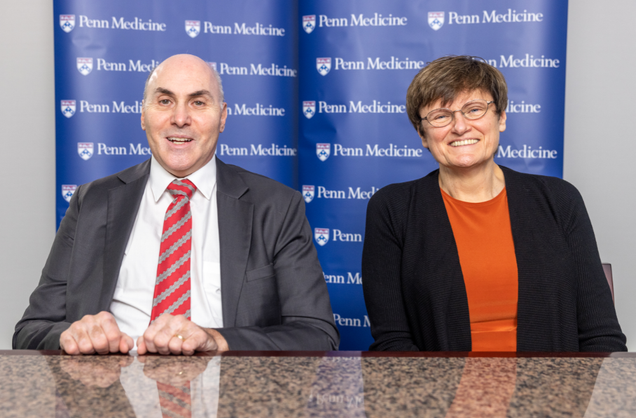Drew Weissman (MED’87) Awarded Columbia’s Horwitz Prize for Pioneering Research on COVID-19 Vaccines
 Drew Weissman, MD, PhD, and Katalin Karikó, PhD. Photo credit UPenn.
Drew Weissman, MD, PhD, and Katalin Karikó, PhD. Photo credit UPenn.
Columbia University will award the 2021 Louisa Gross Horwitz Prize to BUSM alum Drew Weissman (MED’87), MD, PhD, University of Pennsylvania, and Katalin Karikó, PhD, BioNTech and University of Pennsylvania, for their trailblazing work on messenger RNA (mRNA) vaccines for COVID-19. The prize will be presented at a ceremony on January 5, 2022.
COVID-19 is a contagious disease caused by severe acute respiratory syndrome coronavirus 2 (SARS-CoV-2). First identified in late 2019, the spread of SARS-CoV-2 worldwide sparked one of the deadliest pandemics in the past century.
Decades of research on messenger RNA by Weissman and Karikó laid the foundation for the creation of incredibly effective COVID-19 vaccines that are helping to turn the tide of the pandemic.
The idea behind mRNA vaccines is simple. Messenger RNA is already present in humans, where it instructs cells to make proteins, the building blocks of the body. Instead of human proteins, mRNA in vaccines instructs cells to make an inactive fragment of a virus. The viral fragments alert the immune system about the new threat.
Despite the elegant concept, Weissman and Karikó had to overcome several obstacles on their way to making mRNA vaccines a success.
Early in their research, the two discovered that mRNA molecules could not instruct cells to make enough viral protein to trigger an immune response and were highly inflammatory. The mRNA molecules were also destroyed quickly after they were injected into the body.
Years of innovative experiments and clever adjustments led Karikó and Weissman to create a modified version of mRNA. In this alternative form, a key component of mRNA called uridine was substituted with an analog—a molecule that looks and works the same but does not provoke inflammation. This key insight finally transformed mRNA into a viable and highly effective vaccine platform.
Weissman and Karikó’s work represents a historic landmark in vaccine development: The COVID-19 vaccines are the first approved (for emergency use) that use mRNA. Developed just 11 months after scientists in China originally identified and sequenced the virus, these vaccines demonstrate one of the main advantages of the mRNA platform: They are much quicker to produce than traditional vaccines. Previously, no new vaccine had been developed and approved in under four years.
Traditional vaccine platforms require more time to purify proteins in vast quantities or to safely inactivate live viruses; mRNA vaccines, by design, bypass these steps. The swiftness of the platform could be essential for countering other diseases and future outbreaks.
Numerous studies show that the mRNA COVID-19 vaccines are extremely safe and highly effective. Thanks to their pioneering efforts, almost 1 billion doses of mRNA COVID-19 vaccines have been administered so far, greatly protecting people around the world from severe illness and death caused by SARS-CoV-2 infection.
Karikó and Weissman are the 107th and 108th winners of the Horwitz Prize, which is awarded annually by Columbia University for groundbreaking work in medical science. Of the 106 previous Horwitz Prize winners, 51 have gone on to receive Nobel Prizes. The award ceremony and honorary lectures will take place on January 5, 2022.
Information provided by Columbia University.
View all posts